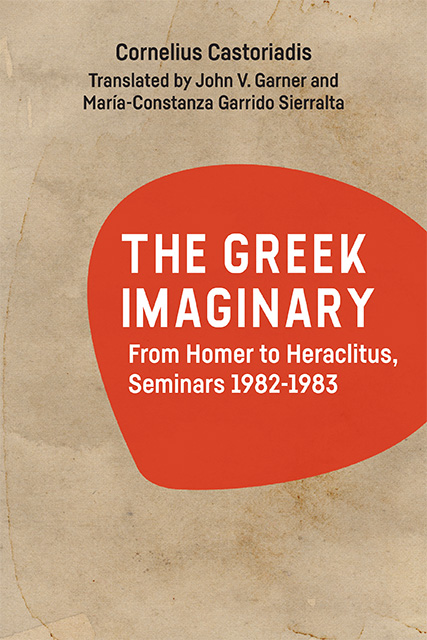Foreword to the English Translation
Published online by Cambridge University Press: 20 October 2023
Summary
The 1982–1983 seminars of Cornelius Castoriadis (1922–1997) at the School for Advanced Studies in Social Sciences (EHESS) in Paris are here translated as The Greek Imaginary: From Homer to Heraclitus, Seminars 1982–1983. They were originally published in French in 2004, with expert editing and supplemental notes provided by Enrique Escobar, Myrto Gondicas, and Pascal Vernay. For basic introductory information on these seminars, their context, and their content, see their excellent Editors’ Introduction which follows. For a general introduction to several themes prevalent throughout these seminars, see Pierre Vidal-Naquet’s essay “Castoriadis and Ancient Greece,” here included as Appendix C. Such an eminent scholar’s praise of Castoriadis’s facility with the Greeks is especially noteworthy: “I could discuss Plato and Aeschylus with him on equal footing” (p. 285). For introductory purposes, I also humbly recommend my “Foreword” to Democracy and Relativism, pages viii–xvii of which address Castoriadis’s relationship to ancient Greek democracy and the relevance of his thinking for us today. I stand by those remarks, especially those on Castoriadis’s non-ethnocentrism; but rather than repeat any of them here, I will focus only on matters of formatting and use of language which are specifically pertinent to this volume.
As for formatting, the reader should be aware of the various editorial marks and notes found in the seminars. The following may serve as a succinct guide:
• Markings in the main body of the seminars:
▷ <words in angle brackets> – These brackets contain words added by the editors for clarifying or interpreting otherwise unclear statements. (See the Editors’ Introduction for more information on their contributions.)
▷ [words in square brackets] – These brackets contain clarifying words—e.g. French terms or language clarifying the context, which have been added by the translators as required for comprehension in English.
▷ The bold heading “Questions” precedes questions raised by the seminar attendees, each rendered in italics. Castoriadis’s responses are in the roman font just as in the seminar body.
- Type
- Chapter
- Information
- The Greek ImaginaryFrom Homer to Heraclitus, Seminars 1982-1983, pp. xi - xviPublisher: Edinburgh University PressPrint publication year: 2023



